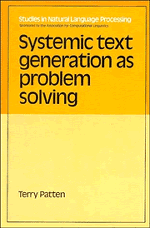Book contents
- Frontmatter
- Contents
- Dedication
- Preface
- 1 Introduction
- 2 Background I: AI problem solving
- 3 Background II: systemic grammar
- 4 The conflation
- 5 The formal model
- 6 The implementation
- 7 Related work in text generation
- 8 Conclusions
- Appendix A OPS5 tutorial
- Appendix B Sample texts
- Appendix C Excerpts from the grammar
- Notes
- Bibliography
- Index
- Frontmatter
- Contents
- Dedication
- Preface
- 1 Introduction
- 2 Background I: AI problem solving
- 3 Background II: systemic grammar
- 4 The conflation
- 5 The formal model
- 6 The implementation
- 7 Related work in text generation
- 8 Conclusions
- Appendix A OPS5 tutorial
- Appendix B Sample texts
- Appendix C Excerpts from the grammar
- Notes
- Bibliography
- Index
Summary
Slang … is often used by people who are deliberately adopting a certain speech variant for social purposes.
(Halliday, 1978, p. 158)The previous two chapters have discussed the independent fields of AI problem solving and systemic grammar. This chapter will point out that in fact there is an important relationship between the two fields that can form the basis for a “Systemic Linguistic Approach to Natural-language Generation” (SLANG). The first few sections will describe the various facets of the relationship between AI problem solving and systemic grammar, and the text-generation method that results. Then some examples will be presented to illustrate the text-generation method just described. Finally there will be a short discussion of the metatheoretical aspects of this approach to text generation.
The fundamental relationship
The central nature of intelligent problem solving is that a system must construct its solution selectively and efficiently from a space of alternatives.
(Hayes-Roth et al., 1983a, p. 20)We shall define language as ‘meaning potential’: that is, as sets of options, or alternatives, in meaning, that are available to the speakerhearer.
(Halliday in deJoia and Stenton, 1980, §572)Compare these two quotations. The fields of study examined in the previous two chapters are both organized around a space of alternatives. Notice that these passages do not refer to peripheral issues; the first few words of each, “The central nature of intelligent problem solving is…” and “We shall define language as …, ” indicate that the issues involving alternatives lie at the nucleus of the respective disciplines.
- Type
- Chapter
- Information
- Systemic Text Generation as Problem Solving , pp. 52 - 76Publisher: Cambridge University PressPrint publication year: 1988

